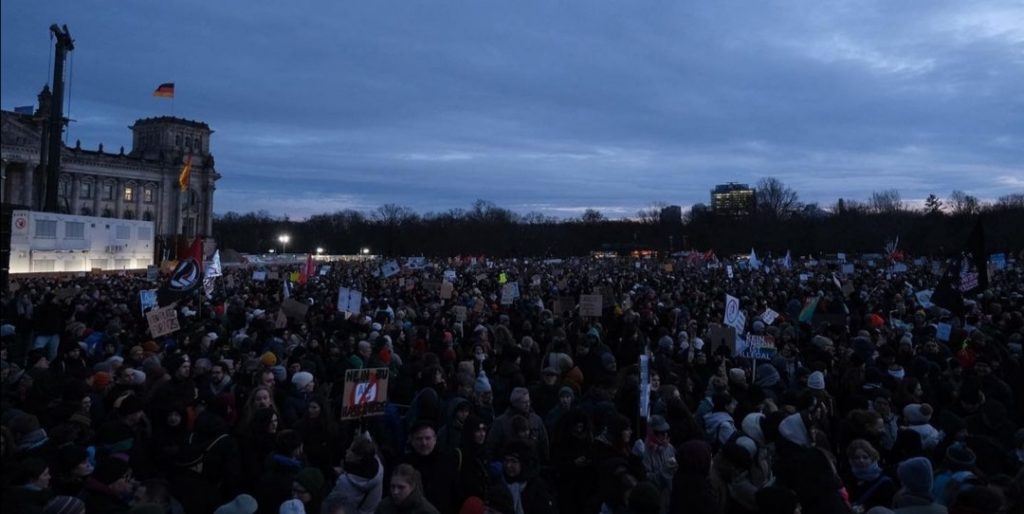Since Friday, over 1.4 million people have protested the far-right party AfD (Alternative for Germany), according to Fridays for Future and the NGO Campact, two of the organizers. Can you talk about the scale of this mobilization and its origins?
On Sunday, the mobilization in Munich was so large — about 250,000 people — that it had to be halted due to overcrowding. In Berlin, over 350,000 people marched to the Bundestag [parliament]. Demonstrations didn’t only take place in the major cities. Smaller towns were also the scene of sizable mobilizations, particularly in the east and in historic AfD strongholds. Anti-AfD mobilizations have multiplied in recent days, with over a hundred rallies held between Saturday and Sunday.
Most “civil society” organizations, NGOs, religious representatives, and even Bundesliga [soccer federation] coaches, as well as youth organizations and some members of the government, had called for the protests. The trade unions, for their part, also sought to mobilize — a new development, but they didn’t mobilize in the workplaces. This broad front brought more than 1.5 million people to the streets, a mobilization unprecedented in Germany in recent years. By way of comparison, the previous major mobilization of this kind against the extreme Right, in 2018, on the initiative of the Unteilbar coalition, brought 250,000 people to the streets.
The scale of the mobilization reflected the shock provoked by the revelation on January 10 by the investigative media Correctiv of a plan initiated by the AfD and neo-Nazi activists, as well as members of the conservative CDU, to mass expel several million people from the country on the basis of their origin, as well as those who come to refugees’ aid, notably in the Mediterranean. This revelation is a deep scandal at a time when the AfD has become the country’s second-strongest political force and is steadily gaining ground in the polls just a few months ahead of three important regional elections in the east, where voting intentions for the far-right party are even higher than in the rest of the country.
You mention a broad “civic front” behind this protest. Over the weekend, the social-democratic chancellor Olaf Scholz joined a protest in Potsdam, as did Foreign Minister Annalena Baerbock and several members of the government, mobilizing to “block” the Far Right. In recent months, however, the ruling coalition has been at the forefront of serious attacks on democratic freedoms, foreigners, and workers in general. Could you elaborate?
Scholz and several of his ministers have indeed decided to join the protests. While government organizations, particularly youth organizations, were very much present this weekend, it seems to me that the picture is mixed for the government, and in particular for the SPD (social democrats). First, because most of the protesters took to the streets with slogans in defense of “democracy,” more against the Far Right than in support of the government. Second, and more importantly, because besides the AfD, the whole regime is shifting to the right. Scholz’s policies, for example, were severely criticized in the marches this weekend. More and more people are becoming aware that the government is doing nothing but creating the conditions for the current growth of the Far Right. This weekend, even organizations such as Fridays for Future openly criticized the government’s policies. A situation that could spell trouble for the Greens, a member of Scholz’s coalition.
In recent months, the Scholz government has pursued a particularly tough policy, especially on immigration. At the end of November, after a conference, the federal and state governments adopted a series of measures designed to reduce migration and tighten asylum policy, as well as reinforcing border controls and facilitating deportations. In line with this, Scholz recently declared that he wants to carry out “large-scale deportations.” Against a backdrop of the violent criminalization of the Palestinian cause, the government has also proposed in recent months to make the granting of German citizenship conditional on recognition of Israel’s right to exist. At the same time, bans on demonstrations have multiplied since October 7, with the support of all the regime’s parties, right up to the reformist left party Die Linke. Over the past few months, the Palestinian and migration issues have come together, against a backdrop of increasing racist rhetoric targeting foreigners, and Muslims in particular.
This context has undoubtedly benefited the AfD. All the more so as inflation continues to eat away at public service budgets, particularly in education and health care, but also for precarious workers. There is a conscious policy of dividing workers in a difficult economic context, while there’s a massive plan passed by the Bundestag to rearm Germany, raise police budgets, and support sanctions against Russia. In my sector, education, it was explained to us that it is impossible to increase salaries because of the money paid to migrants. This weekend’s protests, however, beyond their limits, could pave the way for a different scenario.
In this context, and considering the contradictions you pointed out, what possibilities are opened up by the protests of the last few days, and in particular for the intervention by the Far Left?
Several polls are already showing a shift in public opinion. The latest opinion polls show growing opposition to the ongoing massacre in Gaza and to Scholz’s policy of unconditional support for Israel. In recent days, the AfD has seen a slight decline. Even the CDU was forced, after some of its activists were implicated by Correctiv’s revelations, to openly position itself against the far-right AfD. This situation could complicate the CDU’s electoral prospects for the regional elections, as the organization could need the AfD to govern, even in the event of a minority government.
What is certain is that a mobilization on this scale provides an opportunity to discuss the political response to the Far Right. Many protesters in the marches, for example, called for banning the AfD. While their concern is understandable, these discussions miss the point and give the impression that the danger represented by the rise of the AfD could simply be banned by criminalizing the party, reinforcing illusions in the state. At a time when the government has been the source of serious attacks in recent months, we need to broaden our slogans and make this weekend’s mobilizations a starting point for a wider riposte, notably against anti-Muslim racism, but also because this is linked, against the genocide in Gaza, and finally against the government and the Far Right. This is not yet the direction in which the mobilization seems to be moving. This weekend, protesters in support of Palestine were thrown out of the marches, excluded, and harassed.
The question of union intervention also needs to be addressed. The leadership of labor movement organizations should seek to mobilize in workplaces, convene company meetings to discuss the regime’s right-wing turn, and address the student movement in universities. This is what was at the heart of our intervention with Klasse Gegen Klasse this weekend: reminding us that no illusions could be maintained in the government or in an antifascist front from above, and that we have to organize at the grassroots. This is all the more vital given that you can’t fight the Far Right alongside those who prepare the ground for it, and adopt some of their programmatic elements.
In recent months, the polarization you pointed out has been partly expressed in the eruption of a movement among farmers, as well as in calls for strikes among railway workers. Could you elaborate on these?
There are signs that the social situation may be changing in Germany. Last year had already seen the return of many strikes to win back what had been lost to inflation. Unfortunately, most of these strikes achieved little, but they undoubtedly marked the return of a certain form of social conflict to Germany.
But also in this contexts polarization is on the rise. The farmers’ movement of recent days has been a particularly vivid expression of this. While it expresses social aspirations, it has also served as a platform for reactionary agitation, notably on the part of Finance Minister Christian Lindner — leader of the Liberal Democratic Party (FDP), a member of the government coalition — who has endeavored to position farmers against migrants, the unemployed, and the climate movement. A central task is to link these kinds of concerns with those of the labor movement, getting the trade unions to take up the demands, to take the wind out of the sails of the Right and Far Right.
From this point of view, a key factor is the calls by the metalworkers’ union IG Metall, and above all by the railways union, to reduce working hours. A historic six-day strike will begin this Wednesday at the state-owned rail operator Deutsche Bahn, after the unions rejected the company’s latest wage offer. There is undeniably a new concern about working conditions. Many workers no longer want to work 40 hours a week for poverty wages. This is also the battleground in the fight against the Far Right, and the government it uses as a staging ground. And it’s on this terrain that we need a generalized counterattack.
First published in French on January 22 on Révolution Pérmanente.











